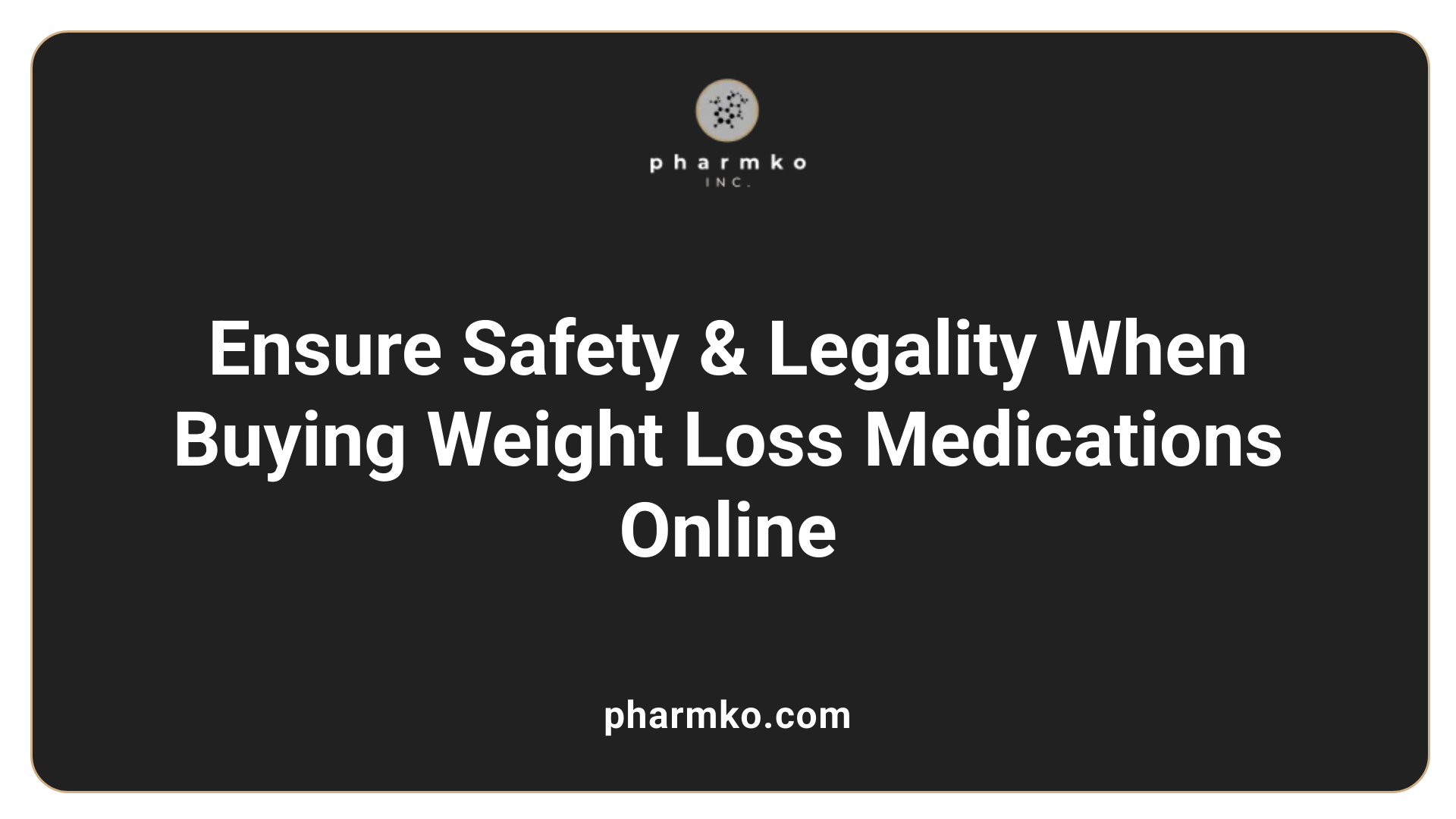Can I get weight medications delivered?
The Rise of Online Weight Management Solutions
In recent years, the landscape of weight loss treatment has transformed dramatically with the advent of telehealth and online pharmacy services. Patients seeking convenient access to FDA-approved weight loss medications can now obtain prescriptions and have medications delivered straight to their doorsteps, making effective treatment more accessible than ever before.
Options for Obtaining Weight Loss Medications via Delivery Services
What are the options for obtaining weight loss medications through online delivery services?
Getting weight loss medications online involves several steps and options, primarily centered around telehealth consultations and licensed pharmacies.
Most patients begin their journey through a virtual consultation with a licensed healthcare provider. During this evaluation, the provider reviews the patient's health history, BMI, and overall suitability for weight-loss medications. This step ensures that the medication is safe for the individual and appropriate for their medical needs.
Once approved, the provider issues a prescription, which can be filled through reputable online pharmacies that offer directly-to-patient delivery or local pharmacy pickup. These pharmacies adhere to strict safety standards, providing tamper-proof, HIPAA-compliant packaging, and trusted courier services. Many services also offer delivery options like same-day shipping, 1-2 business days, or 5-10 days, depending on the availability and location.
Popular telehealth platforms such as Lilly’s LillyDirect and Form Health have streamlined this process. LillyDirect partners with Amazon Pharmacy to provide rapid two-day deliveries for many medications, including some weight-loss drugs. Form Health, along with other online services, facilitates ongoing patient support through regular virtual check-ins and dose adjustments, which are essential for managing treatment effectively.
Common medications accessible via these channels include GLP-1 receptor agonists like semaglutide (Ozempic, Wegovy), tirzepatide (Zepbound, Mounjaro), and off-label use of medications like metformin. These drugs are proven to help with appetite control, slow digestion, and promote weight loss, often leading to a loss of 10-20% of body weight.
To ensure safety, it is crucial for patients to use only trusted online providers and licensed pharmacies. Avoiding unverified sources protects individuals from counterfeit or unsafe medications. The entire process—from consultation to delivery—is designed to be convenient, safe, and effective, providing a modern solution for those seeking medical weight management conveniently from home.
Types of Weight Loss Medications Available for Delivery

What types of weight loss medications are available for delivery?
Patients seeking to lose weight can now access a variety of medications delivered straight to their homes through telehealth services and licensed pharmacies. These medications include FDA-approved options, off-label prescriptions, and compounded drugs, offering a broad spectrum of choices suited to different medical needs.
Among the most common FDA-approved drugs are Wegovy® (semaglutide), Ozempic® (off-label for weight management), Zepbound® (tirzepatide), Saxenda® (liraglutide), Contrave® (a combination of bupropion and naltrexone), and Xenical® (orlistat). These medications come in different forms, primarily as injections or oral pills, designed for long-term management of obesity.
In addition to these, some services offer compounded semaglutide, which is not FDA-approved but is available through certain telehealth providers like Lemonaid Health. These compounded options are tailored formulations prepared by specialized pharmacies, giving patients additional avenues for treatment.
The administration methods vary depending on the medication. Most GLP-1 receptor agonists, such as Wegovy® and Saxenda®, are administered via weekly injections, which help control appetite, slow digestion, and promote sustained weight loss. Oral medications like Xenical® and off-label drugs like metformin are taken daily, providing more flexibility for those who prefer pills.
Supervision by healthcare providers is crucial when using these medications. Physicians evaluate each patient’s health status, medical history, and weight loss goals before prescribing. Regular follow-up consultations help monitor side effects, adjust dosages, and ensure safety.
To guarantee safe and effective treatment, it’s essential to obtain these medications from reputable telehealth platforms that comply with legal and safety standards. Proper medical assessment coupled with accurate prescriptions—delivered by trusted couriers in tamper-proof, HIPAA-compliant packaging—minimizes risks and optimizes results.
The demand for these weight loss medications has increased, especially with the rise of telehealth services that facilitate easy access from home. Patients are encouraged to consult qualified healthcare providers to determine the most suitable medication type and administration method for their individual needs.
Legal and Safety Considerations in Online Medication Purchases

Are there legal and safety considerations when purchasing weight loss medications online?
Yes, purchasing weight loss medications online involves several important legal and safety considerations. In the United States and the UK, regulatory authorities have established strict guidelines to ensure patient safety.
In the UK, online pharmacies are now required to perform in-depth checks before dispensing medications like Wegovy, Ozempic, Zepbound, and other weight loss drugs. This includes conducting in-person or video consultations to verify the patient's body mass index (BMI) and reviewing their medical history or GP details. These regulations are designed to prevent misuse or inappropriate prescribing of high-risk medications.
Similarly, in the US, reputable telehealth platforms and licensed pharmacies adhere to strict licensing standards and safety protocols. They involve a detailed consultation process, often including a review of health questionnaires, medical records, and real-time evaluations by qualified healthcare providers.
The importance of licensing and pharmacy credentials cannot be overstated. Trusted telehealth companies ensure that prescriptions are issued only by licensed providers who follow all legal and safety standards. This approach helps avoid the risks associated with counterfeit or unverified products, which can be ineffective or even harmful.
The risks of purchasing from unverified sources include exposure to counterfeit medications, incorrect dosages, or medications that contain harmful ingredients. Such products may not have undergone proper safety testing or quality control, increasing the danger to patients.
Regulatory bodies such as the General Pharmaceutical Council (UK) and the Food and Drug Administration (US FDA) actively monitor online pharmacy services and conduct regular inspections. These measures aim to uphold safety, prevent illegal activities, and protect consumers.
Furthermore, many platforms now include safeguards like requiring signatures upon delivery or shipping in tamper-proof, HIPAA-compliant packaging to ensure the integrity of the medication and protect patient confidentiality.
In summary, purchasing weight loss medications online is safe only when done through licensed, regulated providers who follow strict legal standards. Patients should always verify the credentials of the pharmacy and provider, insist on proper consultation, and be cautious of unauthorized sources offering prescriptions without proper verification processes.
This comprehensive regulation and oversight aim to balance access with safety, helping patients manage their weight healthily and legally.
Prescription Requirements and Telehealth Options
How can I obtain weight loss medications through telehealth services?
Getting weight loss medications like Ozempic®, Wegovy®, and Zepbound® has become more accessible thanks to telehealth platforms. These services allow you to have virtual consultations with licensed healthcare providers, all from the comfort of your home. During these quick assessments, you typically answer questions about your health, lifestyle, and weight management goals. Many platforms include a short quiz to help determine if you qualify for certain medications.
Once the consultation is complete, the healthcare provider reviews your information to decide if you meet the criteria for prescriptions such as GLP-1 receptor agonists or dual GIP/GLP-1 medications. If approved, the medication can be prescribed remotely and shipped directly to your door, or you can opt for pickup at a local pharmacy.
Are there specific laws or requirements depending on my state?
State-specific laws influence how telehealth providers can prescribe weight loss medications. Some states require in-person visits or physical exams, while others permit virtual prescriptions with proper safety checks. Reputable telehealth companies ensure compliance with all local regulations, which may include documentation, in-person follow-up visits, or additional health assessments.
In some regions, a licensed provider needs access to medical records or lab results before prescribing. Knowing your local laws helps safeguard the quality and legality of your treatment.
What are the medication eligibility criteria, such as BMI thresholds?
Most weight loss prescriptions are targeted at individuals with a Body Mass Index (BMI) of 30 or higher, or 27 with related health conditions like diabetes, hypertension, or high cholesterol. Providers evaluate your BMI as part of the eligibility criteria during the consultation.
Additional factors such as overall health, medical history, and previous weight management efforts also influence whether a medication like Wegovy, Ozempic, or Zepbound® can be prescribed.
How are follow-up appointments and dose adjustments managed?
Ongoing support is fundamental for safe and effective treatment. Telehealth platforms typically schedule follow-up visits every three months to monitor progress, manage side effects, and adjust medication doses if necessary. Patients may also contact their healthcare providers at any point to discuss concerns or experiences.
These regular check-ins help maximize benefits while minimizing potential risks, ensuring that the weight management plan remains tailored to the patient's needs.
Are insurance considerations and prior authorizations necessary?
Many weight loss medications are expensive, and insurance coverage varies. Some plans require prior authorization, which means your healthcare provider must submit justification for the medication based on your health profile.
Patients should verify with their insurance provider beforehand to understand coverage options. Certain telehealth services assist with insurance billing and can help secure prior authorization, reducing out-of-pocket costs.
| Aspect | Details | Additional Notes |
|---|---|---|
| Prescription requirements | Licensed provider evaluation via telehealth | Includes health history, BMI assessment, and more |
| State-specific laws | Varies; some require in-person visits, others permit telehealth | Providers ensure compliance with local regulations |
| Medication eligibility | BMI ≥ 30 or BMI ≥ 27 with health conditions | Medical history and health status also considered |
| Follow-up and adjustments | Regular virtual check-ins every 3 months | Enhances safety and effectiveness |
| Insurance & prior authorization | Varies; some medications need prior approval | Assistance often available through telehealth providers |
Through these processes, obtaining weight loss medications via telehealth remains a safe, legal, and accessible option for many patients seeking support in their weight management journey.
How Delivery Services Operate and Accessibility

How do medication delivery services work and how accessible are they for patients seeking weight loss treatment?
Medication delivery services have transformed the way patients access weight loss medications. The process begins with a telehealth consultation, where patients answer questions about their health history, lifestyle, and weight loss goals. Licensed healthcare providers review this information to determine if medications like semaglutide (Ozempic®, Wegovy®), tirzepatide (Zepbound®), or other prescribed drugs are suitable.
Once approved, patients can place their orders online through secure platforms that connect directly with licensed pharmacies or delivery services. The medications, which are often shipped in tamper-proof, HIPAA-compliant packaging, arrive at the patient’s home within various time frames—ranging from Same Day to 5-10 business days—depending on the delivery option chosen and eligibility.
Delivery services like Walgreens, Nurx, and Amazon Pharmacy facilitate these processes, offering options such as Same Day Rx Delivery, 1-2 business days, or standard shipping. Patients do not always need to be at home; some services allow delivery without requiring a signature or ID, though signature confirmation may be requested for certain medications.
Advanced technology integration enhances safety and authenticity. RFID tags, NFC chips, and blockchain systems are increasingly used to ensure medication integrity and prevent counterfeit drugs. These technologies enable real-time tracking and verification, providing both providers and patients with confidence in the medication’s authenticity.
Accessibility is greatly improved, especially for vulnerable populations. Elderly individuals, those in rural or underserved areas, and people with mobility issues benefit from these services by eliminating the need to visit in-person clinics or pharmacies. Rapid shipping options mean that patients can start or continue their weight loss treatments without long waiting periods.
Despite some initial concerns about safety and communication, regulatory guidelines and the oversight of licensed providers help maintain high standards. These services are often favored over traditional in-store pickup due to their convenience, privacy, and promptness.
The expansion of comprehensive health platforms further aims to integrate prescription management with over-the-counter wellness products, personalized health monitoring, and even AI-driven predictive care.
Overall, medication delivery services are rapidly advancing and becoming an essential part of accessible healthcare, especially in weight management. They reduce barriers, expedite treatment initiation, and support long-term health goals for diverse patient groups.
| Feature | Benefit | Additional Details |
|---|---|---|
| Connection with telehealth providers | Easy prescription process | Qualify through online assessments and consultation |
| Delivery methods & speed | Flexible options | Same Day, 1-2 days, or standard 5-10 days |
| Security features | Ensures safety & authenticity | RFID, NFC, blockchain tech |
| Accessibility for vulnerable populations | Broader reach | Rural, elderly, mobility-challenged |
| Safety & trust | Maintains high standards | Licensed providers, regulatory oversight |
| Technological integration | Improved tracking & verification | Real-time updates, tamper-proof packaging |
Medication delivery services are thus becoming increasingly efficient and reliable, dramatically improving how weight loss treatments are accessed and managed.
Risks and Regulations in Online Medication Purchasing
Are there any risks involved with purchasing weight loss medications online, and what regulations should consumers be aware of?
Buying weight loss drugs through online platforms presents notable risks for consumers. One primary concern is the potential receipt of counterfeit medications or products with incorrect dosages. These unverified drugs may contain harmful ingredients or contaminants, posing serious health hazards.
Many weight loss medications such as semaglutide (Ozempic®, Wegovy®), tirzepatide (Zepbound®), and off-label use of drugs like metformin are available online, but not all sources are legitimate. Especially problematic are compounded versions of these drugs, which are not regulated by the Food and Drug Administration (FDA). Compounded medications are prepared in pharmacies that mix or alter pharmaceutical ingredients, and without proper oversight, they may be unsafe or ineffective.
Regulatory guidelines emphasize that most prescription weight loss medications should only be obtained through licensed pharmacies with a valid prescription from a healthcare provider. There are strict laws preventing the sale of prescription-only drugs without proper documentation. However, numerous unauthorized online sites attempt to sell unapproved or unlicensed products, sometimes advertising them as "research purposes only" to bypass regulations.
The dangers of purchasing these unregulated drugs include severe adverse reactions, overdose, or contamination, which can lead to hospitalization or even death. There have been reports linking fraudulent anti-obesity medications to adverse health outcomes.
To protect yourself, always check the credentials of the pharmacy or online platform. Look for pharmacies that are licensed, require a consultation with a healthcare provider, and provide a legitimate prescription. Trusted platforms adhere to legal standards and prioritize patient safety.
Consultation with healthcare providers before starting any weight loss medication is vital. They can assess your health status, recommend appropriate treatments, and guide you on safe procurement practices.
In sum, the main safety tips include purchasing from licensed pharmacies, avoiding sites that sell drugs without prescriptions, and verifying the credentials of the online provider. This approach minimizes health risks and helps ensure that you receive effective and safe medication tailored to your needs.
Overview of Weight Management Medication Programs and Support Services
What general information is available about weight management medication programs and services?
Weight management programs that include medication are comprehensive offerings designed to support individuals seeking to lose weight effectively and safely. These programs often combine prescription medications with health assessments, ongoing medical support, and lifestyle guidance.
Many services operate via telehealth platforms, allowing patients to consult with healthcare providers from the comfort of their homes. During these consultations, providers review the patient's health history, discuss weight loss goals, and determine eligibility for medications such as semaglutide (Ozempic®, Wegovy®), tirzepatide (Zepbound®), or off-label options like metformin. Patients typically answer questions about their health status, lifestyle, and weight loss goals online, facilitating a quick and accessible evaluation process.
Once approved, medications are prescribed and can be delivered directly to the patient’s door through trusted delivery services. Retailers like Walgreens, Nurx, and Amazon Pharmacy operate these services, offering options including Same Day, 1-2 business days, or longer delivery times, all in tamper-proof, HIPAA-compliant packaging.
These programs are supported by ongoing follow-up, ensuring that patients can receive support for side effects, dose adjustments, and any questions about their treatment. These services are provided by licensed healthcare professionals, following strict safety and legal standards, to ensure proper medication management.
The core of these programs is the combination of medical treatment with personalized guidance. Patients are encouraged to integrate medication use with healthy diet, increased physical activity, and behavioral changes for optimal results. The FDA has approved multiple medications such as orlistat, liraglutide, semaglutide, naltrexone-bupropion, and tirzepatide for long-term use in eligible individuals.
This integrated approach enhances the potential for meaningful weight loss—often ranging between 5% and 20% of initial body weight—while also promoting sustainable lifestyle modifications. The safety profile of these medications is continually monitored by healthcare providers to minimize risks and maximize benefits.
In summary, weight management medication programs are multifaceted services combining medical treatment, professional support, and convenient delivery options. They aim to help individuals achieve their weight loss goals safely while supporting ongoing health and wellness efforts.
Moving Forward with Safe and Effective Weight Management
With advancements in telehealth and online pharmacy services, obtaining FDA-approved weight loss medications has become more convenient and accessible than ever before. Patients should prioritize working with licensed healthcare providers, adhering to safety and legal guidelines, and selecting reputable pharmacies to ensure effective treatment and minimize risks. As technology continues to evolve, the integration of real-time health monitoring and AI-driven support will further enhance personalized weight management efforts, making comprehensive care more attainable for diverse populations everywhere.
References
- How to Get Weight Loss Medication Online | Take Care by Hers
- Prescription Delivery - Same Day Refill - Walgreens
- Online Prescription Weight-Loss Medication | WeightWatchers
- Weight management - Nurx™
- Get prescription weight loss medication online - Dr. B
- MinuteClinic® Weight Loss Program, which may include GLP-1 FDA ...
- Eli Lilly and Amazon: Home Delivery for Weight Loss Drugs
- Prescription Weight Management — Qsymia® (Phentermine and ...
- Weight loss medication online - GLP-1 - Lemonaid Health
- How to Get Weight Loss Medication Online | Take Care by Hers













